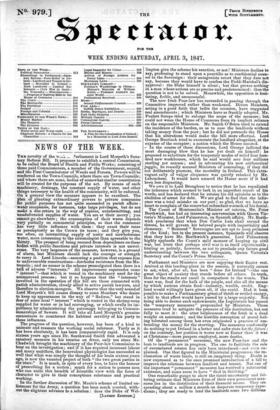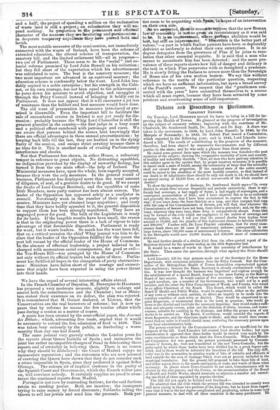Parliament and Ministers are now enjoying their Easter rest. Arrived
at this landing-place in the session, it naturally occurs Parliament and Ministers are now enjoying their Easter rest. Arrived at this landing-place in the session, it naturally occurs to ask, what, after all, has been " done for Ireland "—the one great object of anxiety that stands before all others. In truth, thus far the results are small in comparison to the wants. The want was, food for the bulk of the people, and also all the means by which nations obtain food—industry, wealth, credit. Eng- land would willingly have given all, if she could. Had it been possible to make a Parliamentary grant of thrift or settled energy, a bill to that effect would have passed by a large majority. Not being able to decree such endowments, the Legislature has passed the temporary measures" propounded by Ministers. Those measures tend to mitigate the pressure of the destitution, but not fully to meet it : the utter helplessness of the Irish is a dead weight on assistance ; and the horrible corruption of moral feel- ing tolerated among them has even originated a practice of em- bezzling the money for the starving. The measures confessedly do nothing to put Ireland in a better and safer state for the future : on the contrary, her position.is worse now at Easter than it was at Christmas—more paupers employed, more deaths. Of the " permanent" measures, the new Poor-law and the loan to landlords are in progress. The one to facilitate the sale
of encumbered estates has only been introduced—not even ex-
plained. One that figured in the Ministerial programme, the re- clamation of waste lands, is still an imaginary thing. Doubt is now expressed as to the once promised introduction of a bill to improve the relations between landlord and tenant. Not one of the important " permanent " measures has received a substantial existence, and some seem to have " died in thinking." One remarkable gauge to show the timid uncertainty and fal- tering estimate that Ministers form of their own permanent mea- sures lies in the distribution of their financial means. They are spending about a million a month on desperate temporary expe- dients ; they are ready to lend the landlords some two millions
' and a half; the project of spending a million on the reclamation of waste land is still a ;project.; on colonization they will ex- pend nothing. In :proportion to -the pesmanent 4md-effeastgil character of the measure they ere aaesitating and:parsimonious ; in desperate temporary expedisstas they have proved lbold mad lavish.
The most notable measures of the semi-session, not immediately connected with the wants of Ireland, have been the scheme; of extended education, the altered scheme of transportation, the sanatory bill, and the limited enlistment bill—all in progress— two out of Parliament. These seem to be the "social" and co- lonial reforms promised by Lord John Russell on his reelection ; but they fall short of the expectation which his advertisement was calculated to raise. The best is the sanatory measure; the two most important are advanced in an equivocal manner ; the education scheme is confessedly below the want. Lord John lau- dably aspired to a noble enterprise ; but his strength in the Cabi- net, or his own courage, has not been equal to the achievement : he pares down his measure to avoid objection, and smuggles it through the Privy Council instead of bringing it boldly out in Parliament. It does not appear that it will encounter a jot less of resistance than the boldest and best measure would have done.
The old want of preparation in measures introduced or pro- mised is discernible. Even the important bill to facilitate the tale of encumbered estates in Ireland is not yet ready for dis- 'cussion : probably because the Whig Lord Chancellor is still the greatest pluralist in the country—the first judge in a busy court and a political officer cumbered with patronage and cares. We 'are aware that persons behind the scenes hint knowingly that there are official advantages in these annual procrastinations : by keeping back bills till the last, they are hurried on in the dying flurry of the session, and escape strict scrutiny because there is no time for it. This is another mode of evading Parliamentary interference and checks.
Not that Parliament has shown, in either House, a refractory temper in reference to great objects. No distracting squabbles, no indignation provoked by the display of unworthy feeling, has `turned it from the one main effort—the help of Ireland. The Ministerial measures have upon the whole, been eagerly accepted, because they were the only measures. In the general round of business, Parliament has displayed more than the usual amount of diligence, of zeal, of a genuine desire to do good. If we except the freaks of Lord George Bentinck, and the squabbles of some Irish Members, mere party contest has been almost unseen. The leader of the Opposition has appeared solely as a coadjutor in council. Notoriously weak in the number of their own party muster, Ministers have yet obtained large majorities • and every time that they have boldly appealed to it, the general disposition to support them has been strongly manifested. They have an ungauged power for good. The bulk of the Legislature is ready for its tasks. If the tangible results have been small, the reason is that in the originating power there is a lack of vigour to take advantage of that favourable disposition. Parliament is ready for work, but it wants leaders. So much has the want been felt, that on a critical occasion the chief Whig journal was fain to de- clare that the leader of the Opposition fulfilled for the nonce the post left vacant by the official leader of the House of Commons. In the absence of effectual leadership, a project believed to be charged with momentous social consequences, for good or evil— the Ten-Hours Bill—was arranged by the house of Commons not only without its official leaders but in spite of them. Parlia- ment has fulfilled all hopes in the abnegation of party obstructive- ness : Ministers have fallen short of the courage and earnest- ness that might have been expected in using the power thrust into their hands.



































 Previous page
Previous page